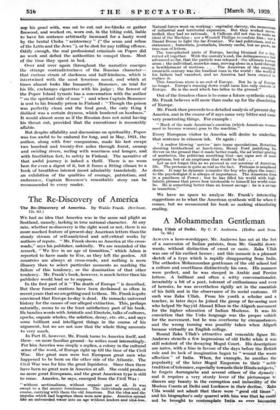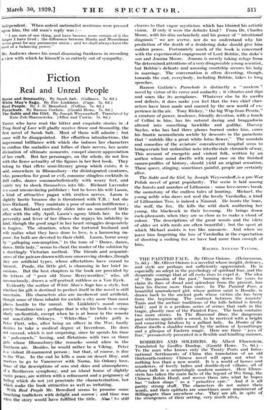A Mohammedan Gentleman
ALWAYS a hero-worshipper, Mr. Andrews has sat at the feet of a succession of Indian patriots, from Mr. Gandhi down- wards, without distinction of creed or caste. Zaka Uhl was one of his earliest heroes ; and this memoir is a pleasant sketch of a type which is rapidly disappearing from India.
The orthodox Mohammedan gentleman of the old school had a culture and courtliness distinctively his own. His manners were perfect, and he was steeped in Arabic and Persian letters. A brilliant and often a witty conversationalist, invariably a bit of a poet, tolerant of enthusiasms and even of heresies, he was nevertheless rigidly set in the essentials of his faith and in the observance of its social customs. Of such was Zaka Ullah. From his youth a scholar and a teacher, in later days he joined the group of far-seeing men who helped Sir Sayyid Ahmad Khan in the Aligarh movement, for the higher education of Indian Moslems. It was his conviction that the Urdu language was the proper vehicle for the movement, but he was overborne by circumstances, and the wrong turning was possibly taken when Aligarh became virtually an English college.
Round Zaka Ullah's attractive and venerable figure Mr. Andrews stencils a few impressions of old Delhi while it was still redolent of the decaying Mogul Court. His descriptions are naive, with a bias in favour of the days before the British rule and its lack of imagination began to " wound the warm affection " of India. When, for example, he ascribes the popularity, of' the later Mogul Emperors to their " noble tradition of tolerance, especially towards their Hindu subjects," he forgets Aurungzebe and several others of the dynasty ; and it requires a very sturdy lover of the picturesque to discern any beauty in the corruption and imbecility of the Moslem Courts at Delhi and Lucknow in their decline. Zaka Ulla would not admit that there were " good old times " ; and his biographer's only quarrel with him was that he could not be brought to contemplate India as ever becoming
independent. When ardent nationalist nostrums were pressed upon him, the old man's reply was :- " I am sure of one thing, and have become more certain of it the longer I have lived ; the difference between Hindu and 'Mussels:nen is too great for any permanent union ; and we shall always have the need of a balancing power."
Mr. Andrews shows his usual disarming frankness in recording a view with which he himself is so entirely out of sympathy.



















































 Previous page
Previous page